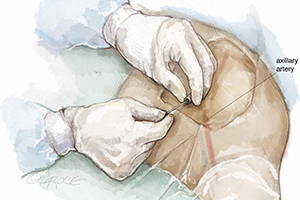A step-by-step guide to trans-axillary transcatheter aortic valve replacement
Abstract
The application of transcatheter aortic valve replacement (TAVR) has expanded rapidly over the last decade as a less invasive option for the treatment of severe aortic stenosis. In order to perform successful TAVR, vascular access must be obtained with a large-bore catheter to deliver the transcatheter valve to the aortic annulus. Several techniques have been developed for this purpose including transfemoral (TF), trans-aortic, trans-apical, trans-caval, trans-carotid, and trans-axillary (TAx) with varying degrees of success. Among them, TF access is the most common and preferred method owing to its superior and well-established outcomes. However, in the setting of diseased iliofemoral arterial vessels, severe tortuosity, or iliofemoral arteries of insufficient caliber, TF access may not be possible. In these scenarios, one of the aforementioned alternative access routes needs to be considered. TAx-TAVR is an attractive alternative because it can be accomplished via access to a peripheral vessel as opposed to needing to enter the pericardial space or thoracic cavity. In addition, the open surgical cut-down procedure used to expose the axillary artery is familiar to cardiac surgeons who are accustomed to cannulating it for cardiopulmonary bypass. With advancements in TAVR technology including the evolution of delivery systems and corresponding smaller sheath sizes, total percutaneous access via the axillary artery is gaining substantial attention. In this review, we outline key aspects of patient selection, imaging and procedural techniques, and examine contemporary clinical outcomes with this approach.
Cover






